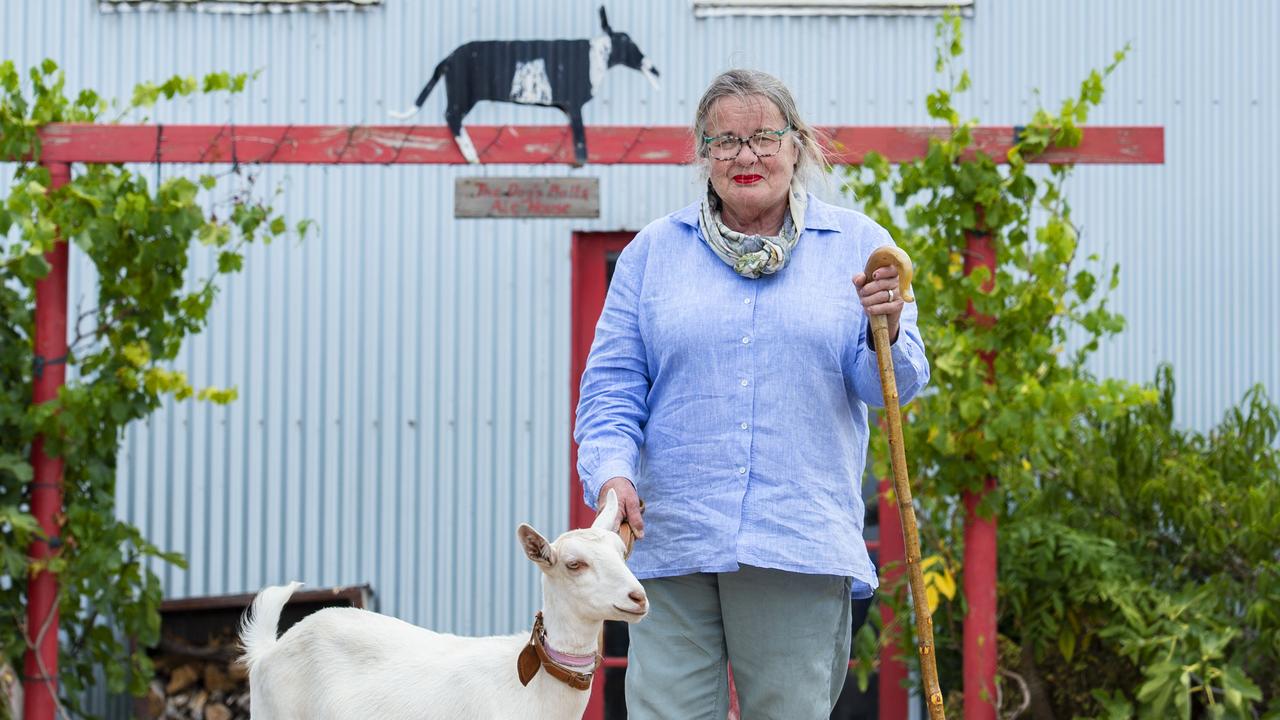Yarragon’s Clifden Farm breeding black alpacas and Belted Galloway cattle
Black fleece has not always been desired by breeders, but this Gippsland farm sought out black alpacas for the property. This is why.

BLACK fleece has not been viewed kindly throughout history.
Black sheep were deemed a loss on the genetic lottery, giving rise to the idiom describing someone odd or an outsider.
Dark wool was deemed less valuable than the lighter counterpart since it could not be dyed. But that is exactly why Lindy Smith chose to stock her property, Clifden Farm, with black alpacas.
“I like the fact the fleece we produce doesn’t need any chemical dye or anything,” she explains. “You only have to look around Melbourne or anywhere else in the world, people will be wearing some sort of black.”
Lindy and her husband, Bill, breed black alpacas as well as Belted Galloway cattle — a Scottish breed Lindy became familiar with when they lived in the UK — at their farm near Yarragon, in West Gippsland.

The Queensland natives came to farming late in life, buying the property in 2007 and adding a second nearby property about five years ago. “You’ve got to have a challenge in life. No point standing still,” says Lindy, who was a speech pathologist.
Alpacas come in many different colours, but Lindy’s herd have a “black pedigree all the way back as far as Australian records go”.
“When we say ‘we breed black’ we want to be sure that we are breeding black. Lots of people will breed alpacas and happen to get a black one, but it hasn’t got a solid black pedigree, so when it’s bred again it can produce any colour.”
Lindy says there is still confusion about the differences between alpacas and their bigger relative in the camelid family,llamas.
And the most common trait people are familiar with, Lindy says, is their most dishonourable one — they spit. But there is generally a reason for this action. Females may spit in order to rebuff males, potentially because she believes she is already pregnant, or when they are threatened or stressed.
Helping her set the record straight is Archie the Black Alpaca, the star of two children’s books Lindy has written. “Because of my background as a speech therapist, I am passionate about kids reading and being read to, and I don’t think you can ever replace that activity,” Lindy says.
“There is the communication side of it but there is also just the physical closeness of sitting with someone who is directing your attention to turning the pages of a book and looking at it and talking about it.
“So it was a marketing exercise for us too. It drew attention to black alpacas and what alpacas are like — and if you teach children, you teach their parents as well.”
The rise in popularity in the name “Archie” for boys (last year it came in at No. 10 in Victoria) also was of benefit.
“All their grandmothers think it’s the thing to do now, to buy their little boy a book, and that’s great.”
While they do sell some entire fleeces, most of the alpaca fleece is processed to yarn, which Lindy then sells, either as balls or as pre-made garments, both online and at markets.
Lindy has only 17 alpacas at the moment — a cria (baby alpaca) was born last week, and more are expected soon. At one stage the herd climbed to 42, but now more of Clifden Farm is devoted to the Belted Galloway cattle (for biosecurity reasons the two are kept separately on the property, Lindy says).

Her own herd was sourced from a breeder near Ararat, who had migrated from Cumbria in northern England and continued to breed “Belties” here. The cattle are primarily sold live to hobby farmers or people wanting to start a commercial herd, Lindy says.
However Lindy says they are also part of Greenham’s Never Ever program, which among its criteria requires animals to be grass-fed,free range and free from antibiotics (Lindy points out that animals that need antibiotics will receive them, but it means they will no longer qualify for the premium grade of meat).
Most cattle are registered on the herd book, but the entire herd is full-blood, Lindy says. It currently sits at about 70.
“It has been higher than that. But we had a lot of sales during lockdown period last year and that was just a factor of it — it was a really good season and a lot of people were home looking at their grass growing and thinking they needed animals to put on it.”
Beside this, farm life itself was minimally impacted by coronavirus last year. But it did mean their farm-stay accommodation was closed between March and November.
When they bought a neighbouring property about five years ago, they converted the original farm house on that second property — which Lindy estimates was built just after WWI — into accommodation which takes in the views of the Strzelecki Ranges.
“People in those days really knew what they were doing,” Lindy says. “While people now might say, ‘why wasn’t it built further up the hill for more of a view?’ it is almost in its own little microclimate there so it gets protected from a lot of wind and rain events, and so on.”
After 14 years of farming, Lindy says while there are tough days and moments, “in the big context of things I would never change it”.
“It has been a fascinating journey — we’ve learnt a lot.”
MORE


